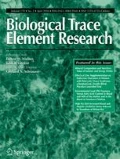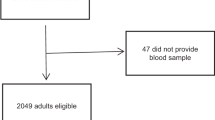Abstract
To understand the effects of excess iodine intake on blood glucose, blood pressure, and blood lipids in adults. We selected three villages from Shanxi Province to conduct cross-sectional survey: Maxi [median water iodine concentration (MWIC) 6.3 μg/L, median urinary iodine concentration (MUIC) 126.6 μg/L, 320 adults]; Xiwenzhuang (MWIC 79.8 μg/L, MUIC 221.2 μg/L, 264 adults); and Gaoche (MWIC 506.0 μg/L, MUIC 421.3 μg/L, 241 adults). According to the urinary iodine levels in adults, the three villages were defined as iodine-adequate, iodine-sufficient, and iodine-excess. Urinary iodine, water iodine, thyroid function, blood glucose, blood pressure, and blood lipids were measured. Compared with the iodine-adequate area, blood glucose and systolic and diastolic pressure of adults in iodine-sufficient and iodine-excess areas increased and high-density lipoprotein-cholesterol decreased (all P < 0.001). Urinary iodine, thyroid-stimulating hormone, and free thyroxine have a nonlinear correlation with blood glucose (R2 = 0.8174, 0.8264, and 0.8520, respectively). Excessive iodine intake may result in elevated blood glucose and blood pressure and has some influence on blood lipids, and may increase the risk of hypertension and diabetes.



Similar content being viewed by others
References
Shen H, Zhang S, Liu S et al (2007) Geographical distribution of high-water iodine areas in China and research on water iodine isolines in high-iodine areas. Chin J Endemiol 26:658–661
Shen H, Liu S, Sun D, Zhang S, Su X, Shen Y, Han H (2011) Geographical distribution of drinking-water with high iodine level and association between high iodine level in drinking-water and goitre: a Chinese national investigation. Br J Nutr 106:243–247
China Center for Disease Control and Prevention, Center for Disease Control and Prevention, National Drinking Water Iodine Survey Report in 2017
Chen W, Zhang Y, Hao Y, Wang W, Tan L, Bian J, Pearce EN, Zimmermann MB, Shen J, Zhang W (2018) Adverse effects on thyroid of Chinese children exposed to long-term iodine excess: optimal and safe tolerable upper intake levels of iodine for 7- to 14-y-old children. Am J Clin Nutr 107:780–788
Aakre I, Strand T, Khalil M et al (2017) Associations between thyroid dysfunction and developmental status in children with excessive iodine status. PLoS One 12:1–15
Kang M, Hwang I, Chung H (2018) Excessive iodine intake and subclinical hypothyroidism in children and adolescents aged 6-19 years: results of the sixth Korean National Health and nutrition examination. Thyroid 28:1–22
Aakre I, Strand T, Bjøro T et al (2016) Thyroid function among breastfed children with chronically excessive iodine intakes. Nutrients 8:2–12
Kassim I, Moloney G, Busili A et al (2014) Iodine intake in Somalia is excessive and associated with the source of household drinking water. J Nutr 144:375–381
Liu L, Wang D, Liu P, Meng F, Wen D, Jia Q, Liu J, Zhang X, Jiang P, Shen H (2015) The relationship between iodine nutrition and thyroid disease in lactating women with different iodine intakes. Br J Nutr 114:1487–1495
Lv S, Xu D, Wang Y, Chong Z, du Y, Jia L, Zhao J, Ma J (2014) Goitre prevalence and epidemiological features in children living in areas with mildly excessive iodine in drinking-water. Br J Nutr 111:86–92
Guo Y, Zynat J, Xu Z, Wang X, Osiman R, Zhao H, Tuhuti A, Abdunaimu M, Wang H, Jin X, Xing S (2016) Iodine nutrition status and thyroid disorders: a cross-sectional study from the Xinjiang autonomous region of China. Eur J Clin Nutr 70:1332–1336
Henjum S, Barikmo I, Strand T et al (2012) Iodine-induced goitre and high prevalence of anaemia among Saharawi refugee women. Public Health Nutr 15:1512–1518
Teng X, Shan Z, Chen Y, Lai Y, Yu J, Shan L, Bai X, Li Y, Li N, Li Z, Wang S, Xing Q, Xue H, Zhu L, Hou X, Fan C, Teng W (2011) More than adequate iodine intake may increase subclinical hypothyroidism and autoimmune thyroiditis: a cross-sectional study based on two Chinese communities with different iodine intake levels. Eur J Endocrinol 164:943–950
Cornier M, Dabelea D, Hernandez T et al (2008) The metabolic syndrome. Endocr Rev 29:777–822
Abuzhalihan JL, Pan S, Ma Y et al (2014) The study of the value of the ratio of waist circumference to hip circumference of Kazakh adult population in Xinjiang to predict hypertension, diabetes and dyslipidemia. Chin J Epidemiol 35:891–895
Jiang X, Yang F, Li K et al (2016) Epidemiological correlation between high iodine intake and abnormal blood lipid and hypertension. Chin J Dis Control 31:601–602
Zhang P, Sang Z, Shen J et al (2015) Impact of high water iodine intake on adult fasting blood-glucose. J Tianjin Med Univ 21:345–348
Liu M, Li S, Li X et al (2009) An exploratory study on the epidemiologic association between high water iodine uptake and abnormal blood pressure. Chin J Epidemiol 24:408–410
Wang J, Sun W, Wells G et al (2018) Pharmacological management of hypertension in the elderly and frail populations. Expert Rev Clin Pharmacol 11:805–817
Yan Y, Zhang Y, Liu L et al (2006) Method for determination of iodine in urine by As3+-Ce4+ catalytic spectrophotometry. Health Standard of China, Beijing WS/T 107–2006
(2007) World Health Organization; The United Nations Children’s Fund; The International Council for Control of Iodine Deficiency Disorders. Assessment of iodine deficiency disorders and monitoring their elimination: a guide for programme managers
Wang H, Liu L, Li S et al (2007) Study on the method of water iodine detection in areas lacking iodine and high iodine. Chin J Endemiol 26:333–336
Teng W, Shan Z, Teng X, Guan H, Li Y, Teng D, Jin Y, Yu X, Fan C, Chong W, Yang F, Dai H, Yu Y, Li J, Chen Y, Zhao D, Shi X, Hu F, Mao J, Gu X, Yang R, Tong Y, Wang W, Gao T, Li C (2006) Effect of iodine intake on thyroid diseases in China. N Engl J Med 354:2783–2793
Calil-Silveira J, Serrano-Nascimento C, Laconca R et al (2016) Underlying mechanisms of pituitary-thyroid axis function disruption by chronic iodine excess in rats. Thyroid 26:1488–1498
Dong H (2012) Effect of high iodine on oxidative damage. Master Thesis, Shan Dong University
Nudda A, Battacone G, Bomboi G, Floris B, Decandia M, Pulina G (2013) Effect of dietary iodine on thyroid hormones and energy blood metabolites in lactating goats. Animal 7:60–65
Sarkar D, Chakraborty A, Saha A, et al. (2018) Iodine in excess in the alterations of carbohydrate and lipid metabolic pattern as well as histomorphometric changes in associated organs. J Basic Clin Physiol Pharmacol aop. 1–13
Agbaht K, Erdogan M, Emral R et al (2014) Circulating glucagon to ghrelin ratio as a determinant of insulin resistance in hyperthyroidism. Endocrine 45:106–113
Rust P, Ekmekcioglu C (2017) Impact of salt intake on the pathogenesis and treatment of hypertension. Adv Exp Med Biol 956:61–84
Xu J, Yang X, Guo H et al (2006) Intervention of selenium on excessive iodine lipid metabolism disorder in mice. J Hyg Res 35:52
Zhao L, Xu J, Peng X et al (2010) Dose and time-dependent hypercholesterolemic effects of iodine excess via TR b1-mediated down regulation of hepatic LDLr gene expression. Eur J Nutr 49:257–265
Liu M, Li S, Li X, Wang PH, Liang P, Li SH (2009) An exploratory study of the relationship between high water iodine intake and dyslipidemia epidemiology. Chin J Epidemiol 30:699–701
Sasaki S, Kawai K, Honjo Y, Nakamura H (2006) Thyroid hormones and lipid metabolism. Nippon Rinsho 64:2323–2329
Berti J, Amaral M, Boschero A et al (2001) Thyroid hormone increases plasma cholesteryl ester transfer protein activity and plasma high-density lipoprotein removal rate in transgenic mice. Metabolism 50:530–536
Huesca-Gómez C, Franco M, Luc G et al (2002) Chronic hypothyroidism induces abnormal structure of high-density lipoproteins and impaired kinetics of apolipoprotein A-I in the rat. Metabolism 51:443–450
Acknowledgments
The authors are grateful for the assistance provided by the Institute for Prevention and Treatment of Endemic Disease of Shanxi for collecting epidemiological data and urine samples, and contributions and support from all participants.
Funding
This work was supported by the National Natural Science Foundation of China (Grant No. 81573098).
Authors’ Contributions
Hongmei Shen and Lixiang Liu designed the research. Hongmei Shen, Xing Jin, Lixiang Liu, Qingzhen Jia, and Xiangdong Zhang conducted the research. Jiwei Liu analyzed the data and wrote the paper. Hongmei Shen had primary responsibility for the final content. All authors read and approved the final manuscript. Jiwei Liu and Lixiang Liu contributed equally to the work.
Author information
Authors and Affiliations
Corresponding author
Ethics declarations
All the procedures used in this experiment were reviewed and approved by the Biomedical Research Ethics Committee of Harbin Medical University. Informed consent was obtained from all individual participants included in the study.
Conflict of Interest
The authors declare that they have no conflict of interest.
Informed Consent
Informed consent was obtained from all individual participants included in the study.
Additional information
Publisher’s Note
Springer Nature remains neutral with regard to jurisdictional claims in published maps and institutional affiliations.
Rights and permissions
About this article
Cite this article
Liu, J., Liu, L., Jia, Q. et al. Effects of Excessive Iodine Intake on Blood Glucose, Blood Pressure, and Blood Lipids in Adults. Biol Trace Elem Res 192, 136–144 (2019). https://doi.org/10.1007/s12011-019-01668-9
Received:
Accepted:
Published:
Issue Date:
DOI: https://doi.org/10.1007/s12011-019-01668-9




